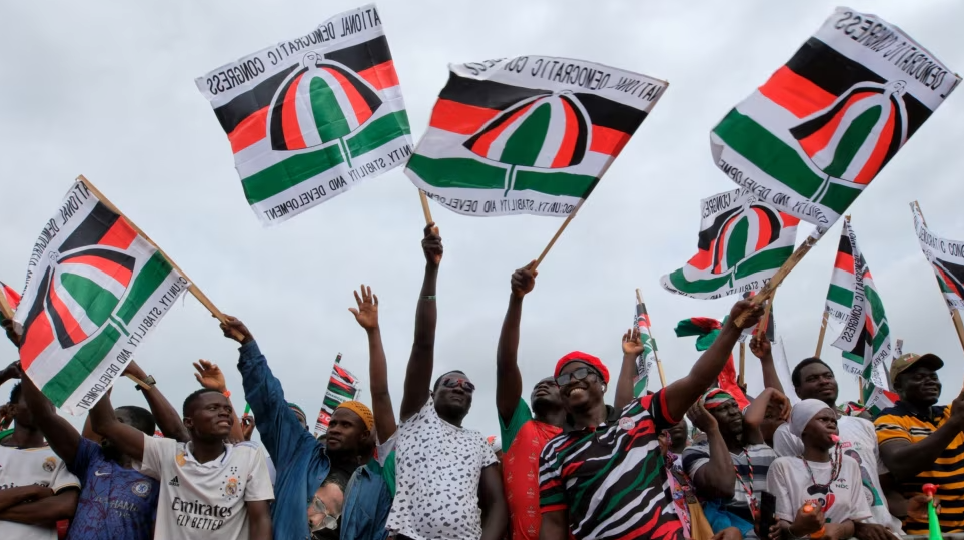
Elena Perez Celis
Dec 07, 2024
Ghana’s political scene is dominated by two major parties: the New Patriotic Party (NPP) and the National Democratic Congress (NDC). Leading the presidential race are Mahamudu Bawumia, the current vice-president, and John Mahama, a former president.
Bawumia has served as vice-president under Nana Akufo-Addo for eight years. With Akufo-Addo reaching his term limit, Bawumia is stepping forward to continue the NPP’s governance. Meanwhile, Mahama, who led the country from 2012 to 2016, aims to regain the presidency.
Other notable candidates include Nana Kwame Bediako, a successful businessman known for his entrepreneurial ventures, and Alan Kyerematen, the former Minister of Trade and Industry, who left the NPP in 2023 to pursue his independent bid.
Ghana has long been celebrated as a model of democracy in Africa, with peaceful transitions of power since the return to multiparty democracy in 1992. The nation’s robust electoral processes continue to earn international recognition. Results from this tightly contested election are expected by 10th December.
Alex Vines, Director of the Africa Programme at Chatham House, a leading international affairs think tank, describes the election as unpredictable. “This will be a fiercely contested election. While earlier this year the NDC seemed likely to win, the race has tightened considerably. A second round for the presidential election is possible, and parliamentary results may diverge from the presidency,” he notes.
Economic issues are central to this election, as Ghanaians grapple with inflation, unemployment, a high cost of living, and mounting national debt. The aftermath of Ghana’s 2022 default and external global shocks have strained the economy further. High inflation and a depreciating cedi are among the most pressing concerns.
In May 2023, the IMF approved a $3 billion extended credit facility for Ghana, running until 2026. The programme’s strict financial requirements will shape the next administration’s policies, limiting the scope for immediate reforms. However, both major parties are trying to navigate these constraints.
The NDC under Mahama plans to increase government spending in social sectors.
The NPP, led by Bawumia, prioritises economic stability, focusing on lowering inflation and attracting private investment.
“Fiscal policy will remain constrained by the IMF programme,” explains Jervin Naidoo, a political analyst at Oxford Economics Africa. “Short-term economic impact from party promises is unlikely due to these restrictions.”
Inflation remains a critical challenge. Consumer prices rose 23% year-on-year in November 2024, with basic foodstuffs driving the increase. The cedi’s ongoing depreciation, exacerbated by the Covid-19 pandemic and Ghana’s 2022 debt default, has further strained the economy. Since 2020, the US dollar has gained nearly 180% against the cedi.
The next administration will face the daunting task of stabilising the economy, reforming fiscal policies, and attracting fresh investment.
“Ghana’s leaders are over-promising while underplaying the tough choices ahead,” warns Vines. “Scrutiny of their proposals is essential to understand how they plan to navigate these challenges.”
At ADD™, we closely observe elections like Ghana’s to understand their potential impact on governance, economic stability, and regional investment climates. As a company committed to due diligence, we recognise that political developments significantly influence the business environment. Ghana’s outcome will offer key insights into how African democracies manage economic challenges and electoral transitions, guiding our analyses and partnerships across the continent.
☗Muinmos & Africa Due Diligence - ADD™ Partner to Boost Trust in Africa's Financial Sector
☗Africa's fintech sector is booming
☗Africa Beckons Investors: Debunking the Myth of High Risk
☗BRICS Expansion: Africa at the Centre and the Future of Crypto Adoption
☗Boosting Intra-African Trade with Regional Value Chains
☗GABS 2024: Strengthening Germany-Africa Economic Partnerships
☗Nigeria’s Central Bank Raises Interest Rates Again Amid Rising Inflation
☗Sarama Resources Initiates Legal Action Against Burkina Faso Government After Unlawful Withdrawal of Mining Permit
☗Intra-Africa trade: The Key to Africa’s Economic Growth & AfCFTA’s Role
☗Human Rights and Industrialisation in Focus at Addis Ababa Conference
Subscribe to receive our latest posts & updates via email.